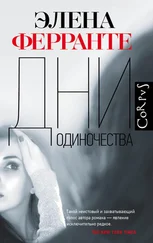“Her?”
“Yes. Your father’s sister is an envious woman. Not envious the way others might be, but envious in a very terrible way.”
“What did she do?”
“Everything. But above all she refused to accept your father’s success.”
“In what sense?”
“Success in life. How hard he worked at school and university. His intelligence. What he has constructed. His degree. His job, our marriage, the things he studies, the respect that surrounds him, the friends we have, you.”
“Me, too?”
“Yes. There is no thing or person that for Vittoria isn’t a kind of personal insult. But what offends her most is your father’s existence.”
“What kind of work does she do?”
“She’s a maid, what should she do, she left school in fifth grade. Not that there’s anything bad about being a maid, you know how good the woman is who helps Costanza in the house. The problem is that she also blames her brother for this.”
“Why?”
“There’s no why. Especially if you think that your father saved her. She could have ruined herself even further. She was in love with a married man who already had three children, a criminal. Well, your father, as the older brother, intervened. But she put that, too, on the list of things she’s never forgiven him for.”
“Maybe Papa should have minded his own business.”
“No one should mind his own business if a person is in trouble.”
“Yes.”
“But even helping her was always difficult, she repaid us as destructively as possible.”
“Aunt Vittoria wants Papa to die?”
“It’s terrible to say, but it’s true.”
“And there’s no way to make peace?”
“No. To make peace, your father, in Aunt Vittoria’s eyes, would have to become a mediocre man like the ones she knows. But since that’s not possible, she set the family against us. Because of her, after your grandparents died we couldn’t have a real relationship with any of the relatives.”
I didn’t respond in a meaningful way, I merely uttered a few cautious or monosyllabic phrases. But at the same time I thought with revulsion: so I am taking on the features of a person who wants my father dead, my family ruined, and the tears flowed again. Noticing, my mother tried to stop them. She hugged me, murmured: there’s no need to feel bad, is the meaning of what your father said clear now? Eyes lowered, I shook my head energetically. So she explained to me softly, in a tone that was suddenly amused: for us, for a long time, Aunt Vittoria has been not a person but a locution. Sometimes, when your father isn’t nice, I scold him jokingly: be careful, Andrea, you just put on the face of Vittoria. And then she shook me lovingly, repeated: it’s a playful expression.
I muttered darkly:
“I don’t believe it, Mamma, I’ve never heard you talk like that.”
“Maybe not in your presence, but in private, yes. It’s like a red signal, we use it to say: look out, it would be all too easy for us to lose everything we wanted for our life.”
“Me, too?”
“No, what are you talking about, we’ll never lose you. You are the person who matters most in the world to us, we want all the happiness possible for your life. That’s why Papa and I are so insistent about school. Now you’re having some little difficulties, but they’ll pass. You’ll see how many great things will happen to you.”
I sniffled, she wanted to blow my nose with a handkerchief as if I were still a child, and maybe I was, but I avoided it, and said:
“What if I stopped studying?”
“You’d become ignorant.”
“So?”
“So ignorance is an obstacle. But you’ve already gotten back on track with studying, haven’t you? It’s a pity not to cultivate one’s intelligence.”
I exclaimed:
“I don’t want to be intelligent, Mamma, I want to be beautiful, like the two of you.”
“You’ll be much more beautiful.”
“Not if I’m starting to look like Aunt Vittoria.”
“You’re so different, that won’t happen.”
“How can you say that? Who can I ask, to find out if it’s happening or not?”
“There’s me, I’ll always be here.”
“That’s not enough.”
“What are you proposing.”
I almost whispered:
“I have to see my aunt.”
She was silent for a moment, then she said:
“For that you have to talk to your father.”
9.
I didn’t take her words literally. I assumed that she would talk to him about it first and that my father, as soon as the next day, would say, in the tone I loved best: here we are, at your orders, if the little queen has decided that we have to go meet Aunt Vittoria, this poor parent of hers, albeit with a noose around his neck, will take her. Then he would telephone his sister to make a date, or maybe he would ask my mother to do it, he never concerned himself in person with what annoyed or irritated or grieved him. Then he would drive me to her house.
But that’s not what happened. Hours passed, days, and we scarcely saw my father. He was always tired, always torn between school, some private lessons, and a demanding essay that he was writing with Mariano. He left in the morning and returned at night, and in those days it was always raining: I was afraid he’d catch cold, get a fever and have to stay in bed till who knows when. How is it possible—I thought—that a man so small, so delicate, has fought all his life with Aunt Vittoria’s malice? And it seemed even more implausible that he had confronted and kicked out the married delinquent with three children who intended to be the ruin of his sister. I asked Angela:
“If Ida fell in love with a delinquent who was married with three children, what would you, the older sister, do?”
Angela answered without hesitation:
“I’d tell Papa.”
But Ida didn’t like that answer, she said to her sister:
“You’re a snitch, and Papa says a snitch is the worst thing there is.”
Angela, miffed, answered:
“I’m not a snitch, I’d only do it for your own good.”
“So if Angela is in love with a delinquent who’s married with three children, you won’t tell your father?”
Ida, as an inveterate reader of novels, thought about it and said:
“I would tell him only if the delinquent is ugly and mean.”
There, I thought, ugliness and meanness are more important than anything else. And one afternoon when my father was out at a meeting I cautiously returned to the subject with my mother:
“You said we would see Aunt Vittoria.”
“I said you had to talk about it with your father.”
“I thought you talked to him.”
“He’s very busy right now.”
“Let’s go the two of us.”
“Better if he takes care of it. And then it’s almost the end of the school year, you have to study.”
“You two don’t want to take me. You’ve already decided not to.”
My mother assumed a tone similar to the one she’d used until a few years earlier when she wanted to be left alone and would propose some game that I could play by myself.
“Here’s what we’ll do: you know Via Miraglia?”
“No.”
“And Via della Stadera?”
“No.”
“And the Pianto cemetery?”
“No.
“And Poggioreale?”
“No.”
“And Via Nazionale?”
“No.”
“And Arenaccia?”
“No.”
“And the whole area that’s called the Industrial Zone?”
“No, Mamma, no.”
“Well, you have to learn, this is your city. Now I’ll give you the map, and after you’ve done your homework you study the route. If it’s so urgent for you, one of these days you can go by yourself, to see Aunt Vittoria.”
That last phrase confused me, maybe it hurt me. My parents wouldn’t even send me by myself to buy bread down the street. And when I was supposed to meet Angela and Ida, my father or, more often, my mother drove me to Mariano and Costanza’s house and then came to pick me up. Now, suddenly, they were prepared to let me go to unknown places where they themselves went unwillingly? No no, they were simply tired of my complaining, they considered unimportant what to me was urgent, in other words they didn’t take me seriously. Maybe at that moment something somewhere in my body broke, maybe that’s where I should locate the end of my childhood. I felt as if I were a container of granules that were imperceptibly leaking out of me through a tiny crack. And I had no doubt that my mother had already talked to my father and, in agreement with him, was preparing to separate me from them and them from me, to explain to me that I had to deal with my unreasonable, perverse behavior by myself. If I looked closely behind her kind yet weary tone, she had just said: you’re starting to annoy me, you’re making my life difficult, you don’t study, your teachers complain, and you won’t stop this business about Aunt Vittoria, ah, what a fuss, Giovanna, how can I convince you that your father’s remark was affectionate, that’s enough now, go and play with the atlas and don’t bother me anymore.
Читать дальше

![Элена Ферранте - История о пропавшем ребенке [litres]](/books/32091/elena-ferrante-istoriya-o-propavshem-rebenke-litres-thumb.webp)
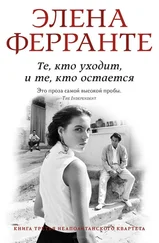
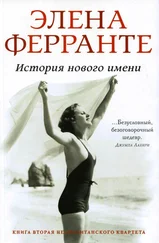
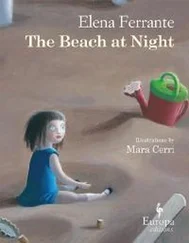
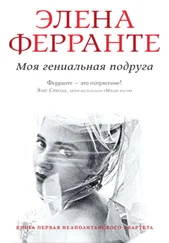
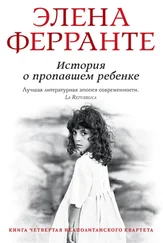
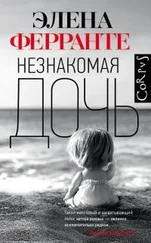
![Элена Ферранте - Дни одиночества [litres]](/books/404671/elena-ferrante-dni-odinochestva-litres-thumb.webp)


